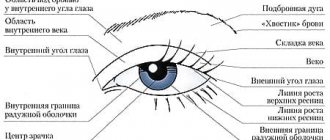Yana Yutskovskaya: “Even people from Europe come to study with us”
Indeed, in medicine, more than in any other field, personality is very important. Even Hippocrates and Aristotle were representatives of medical dynasties.
Yana Yutskovskaya is the owner of the network of clinics “Professor Yutskovsky Clinic” in Vladivostok and the “Professor Yutskovsky Clinic” in Moscow - the successor to the work of her father, Professor Alexander Yutskovsky. And the word “dynasty” is of great importance to her...
— Yana Aleksandrovna, your family clinic in Vladivostok celebrates its 25th anniversary this year. A quarter of a century is a serious milestone for a medical institution; during this time the country has become completely different, and you continue to work. Is it difficult to survive in modern conditions?
- Everything is both simple and complex. First of all, you need to be a professional, you need to love your job and understand: you have chosen your path, and you should follow it, no matter what happens.
— You started when there was no cosmetology as a specialty yet...
— I would like to clarify one point so that there is no confusion. My father started it after all. In 1990, he moved from Zaporozhye to Vladivostok, where, after defending his doctoral dissertation, he was offered the position of head of the Department of Dermatovenereology at VSMI. At the same time, the first medical cosmetology clinic was opened in Vladivostok - MUP. Yes, there really was no specialty in cosmetology in those years. But cosmetology services already existed.
By the time I graduated from the Zaporozhye Institute and came to my parents in Vladivostok, my father had already opened his own clinic. I started working for him. First as a nurse (since I had a diploma, but no specialty), then, having received documents, as a dermatologist. She was engaged in cosmetological techniques that existed at that time in the clinic. Of course, compared to today's cosmetology, it was all a little funny: hair removal, masks, treatments, massages... But I can say that I can do EVERYTHING: I am a universal cosmetologist. Today there are very few such doctors, because in our age of speed, everyone who has learned to give a couple of injections already calls himself a cosmetologist. Previously, we spent years developing our skills. I still continue to practice every day, I do not leave my work as a doctor and will never leave it. Still, by nature I am not an administrator, but first and foremost a doctor.
— Nevertheless, you already skillfully manage several clinics and another school. At what point did you decide to expand? Why did they suddenly set off to conquer Moscow?
— Moscow is a special world. Here the perception of many things is completely different than in the regions. And it was interesting for me to bring my ideas, which we promoted in Vladivostok, to life here too.
- What are these ideas?
— In our clinics we are moving towards improving the quality of life. We even introduced a name - it sounds a little heavy, but it fully reflects the meaning: “clinical examination of quality of life” or “clinical examination of aging.” When a patient comes to us, we try to explain to him that at every age there are some characteristics that need to be corrected. That is, if a person came to us for the first time at 50 years old, then I can only deal with camouflage. But if at 30-35, then real prevention of aging: skin, mucous membranes, neoplasms, hair, nails. In general, we try to keep in sight those people who have become our patients.
We have a very interesting project that we have been developing for two years with the participation of two foreign universities. We intend to restore people's metabolic health: there is nutrition, and the amount of fluid, everything in a complex. But this is not dietetics - something else. A completely new vision of the process.
— So you have, one might say, an interdisciplinary approach to solving aesthetic and anti-age problems, and not just the opportunity to come and get injections of beauty and youth?
— Yes, and this is the system that, in my opinion, cosmetology should come to. After all, cosmetology is the applied science of preventing aging. Looking at the skin, you can immediately tell what problems the patient has: this is the art of a dermatologist.
But injections of beauty and youth are also effective and necessary techniques. The only question is that they are not shown to everyone and not at any age. In order to choose the ones that are right for you, you need to do a skin diagnosis, analyze the patient’s type of aging, and look at the hormonal status. Based on the data, assume which aging mechanism will be leading. And only then choose which injections to prefer. But not like this: if you bought a drug, let’s inject it to everyone. This is illiterate and, unfortunately, harms cosmetology.
Moscow was not built in a day…
— Your Moscow clinic will be five years old in 2022. Of course, not a quarter of a century, as in Vladivostok, but also an important milestone. Was it difficult to conquer Moscow?
— There are many features, we had to develop new work models on the go. Elena Vasilyevna Malysheva taught me a lot. I thank God for putting me in touch with this amazing, absolutely amazing woman. You know, there are people with narrow thinking, and there are those who have no boundaries at all in their perception of the world. Elena Vasilievna is exactly like that. She showed me a lot of things that I couldn't see in the region. I enjoy working with her because she is demanding and I like that. In addition, thanks to her I got to know a lot of famous people. And this also helped me in my work, because Moscow is home to celebrity patients, and you need to be able to work with such people. This is interesting to me, this is a special experience.
— Does this mean that your Moscow clinic is focused primarily on VIP clients?
- In no case! All our clinics are aimed at the middle class. And Moscow is no exception. At the same time, for example, we have patients who do not want to be seen. No problem! Our clinic has three exits; even my office has a separate door leading out to the street.
Our main contingent is the middle class. Because this is the future. We strive to ensure that everyone who wants can afford our services. Relatively speaking, there are expensive programs that can be done once every five years and enjoy the effect. And you can make more budget ones every year, but the result will be the same.
After all, medicine is a number of cases, it is a skill. If, for example, I gave a hundred injections a month, then I know how to do it. If it’s only ten, then I have to look at what I’m capable of. As soon as the people setting high prices come to the realization that the period of primary earning capital in medicine in Russia is over, this will only benefit the industry.
— Any successful project is, first of all, a team. And even more so in medicine. How do you select personnel?
— We have an excellent team - this applies to all clinics. Firstly, all our employees are participants in the process. Always! Everyone knows their position, knows what they want. I don’t have the idea that people come just to make money. I believe that a team should have a dream. Everyone has their own, but it must be present.
At the clinic in Vladivostok, we initially had a very high level of specialists. After all, my father and I have been implementing in-clinic continuous medical education for 15 years.
When I decided to open a clinic in Moscow, many local old-timers recommended that I recruit doctors with their clientele, give them offices, and let them work. This is not my way. Therefore, I took several doctors from Vladivostok, and invited several more who shared my strategy from different regions (including Moscow). My father and I decided to train the rest of the specialists ourselves. This is how the School of Professor Yutskovskaya appeared in Moscow, which started operating on the basis of our new clinic. In principle, this project began in Vladivostok. Here we simply continued what we started. But now we have a fairly large number of specialists who want to study only with us. Because they know the learning model. My belief: cosmetologists cannot be trained like all other specialists, because we do not have standards. A cosmetologist needs to be taught beauty, he needs to be taught the logic of thinking. A cosmetologist must be a psychologist, an endocrinologist, a therapist, and a gynecologist...
— In this School, do you train specialists only for your own clinics, or can anyone come to you?
— Any specialists who want to learn. They come from everywhere, not only from Russia. Even from Europe. We are very friendly with the medical community of Kazakhstan and Ukraine. Many doctors study from Georgia and Armenia. They come from Azerbaijan in groups of 20 people. They undergo training and go back.
And, of course, we train specialists for our clinic. They have the advantage of studying for free.
— Is school the main project for you now, to which you devote your time and energy?
— For me, this is not so much an educational project as an image one. I want to realize myself in terms of creating a cosmetologist training model. I'm interested. I’ve been doing this all my life and I know how to do it, so I can succeed.
But my interests are not limited to the School. Next year - I think in the middle of the year - we plan to open a third clinic in Sochi.
Interview
Vladivostok, April 5, PrimaMedia.
Professor, Doctor of Medical Sciences, owner of a network of cosmetology clinics LLC Professor Yutskovsky Clinic (Vladivostok) and LLC Professor Yutskovsky Clinic (Moscow), President of the Association of Gender Medicine Specialists (Moscow), freelance expert of Roszdravnadzor of the Ministry of Health of the Russian Federation, businesswoman and simply a strong woman Yana Yutskovskaya spoke in an interview with Victoria Vorozhbit about her weaknesses, raising children, her sense of homeland and why she will never leave the country.
“I never kept diaries or wrote romantic teenage poems.” About sentimentality
“They told me that you have a stern disposition, and if you don’t like the question, you can just get up and leave.” This is true? - No, I’m not so poorly brought up as to get up and leave. But there is some truth in these words: with age (if we consider age as wisdom), you can allow yourself to make choices regarding not only work, but also communication. Therefore, if you stop liking something so much that it becomes unacceptable, then you can really get up and leave. - You are a strong person. - Yes - Do you have any weaknesses? - Yes. My weakness is my family. That's why I talk so inactively about myself as a person. This is already the entrance to my space. My weakness is my boys, my parents, my sister, my grandmother, my nephews. At work you are alone, but at home you are completely different, at home I allow myself to be vulnerable. At home I taught myself to be a mother, a wife, a beloved girl. - Who is the boss at home? — Husband, although, in general, we are fairly equal partners. But in general, from the outside, people who don’t know us think that I am stronger than my husband. These are those who really don’t know us as a couple. “If a man has conquered a strong woman, then he is already several times stronger than her. It’s just that an intelligent man can behave in such a way that a woman does not feel this distance. And sometimes she even allows her to show her aggression, but not in relation to him, but in relation to the world, as in business, for example” - At the same time, I automatically, if, for example, I got scared, I go behind my husband’s back. And this happens from the first day of our meeting. In the house I am a small child who can take some liberties. And the husband is an adult who understands that this child knows the boundaries. - That is, you are in the full sense of the word behind your husband. - Yes, absolutely. And a little for the dad and, it seems to me, a little for the son. In general, I'm behind the men in our family. - How do you lose your temper? - Differently. I can cry. This is amazing, some of my girlfriends who are friends with me, after 15 years for the first time seeing how I could cry, were shocked and confused. This doesn't happen to me every day, of course. I can yell because of injustice - this is the only reason for which I can really yell. When they don’t hear me, don’t want to understand, and I understand that I’m hitting a wall, this state depresses me. This is the only thing that can really piss me off. — Are you a sentimental person? — In relation to loved ones, yes. And it’s not like that in life.
I'm not the one to shed tears for a dead kitten. I will shed tears if my son made a cake and it is not the same color, so he will remake it a hundred times, and I will quietly close myself in the room and can cry. Because his disappointment from the fact that he tried, but it didn’t work out, can lead me into this state of sentimentality.
I'm very sentimental about old people. I try to work in various social programs that are aimed at helping the elderly. Because these are the people to whom we really have to give for the fact that we are alive, for the fact that this is our country, for the fact that no one oppresses us here and everything else. In relation to men - no. I never kept girl diaries, never wrote romantic teenage poems. Although I wrote poems in my youth, they were serious poems: about the dangers of drug addiction, about Victory Day. Not about love. I am romantic, I love romantic meetings with my husband by candlelight, going to the opera in beautiful outfits. But these are different things. This is not sentimentality. I'm not sentimental towards men.










